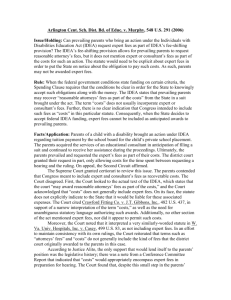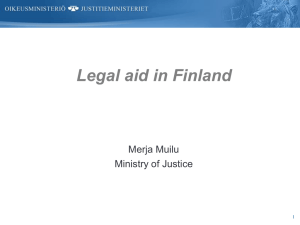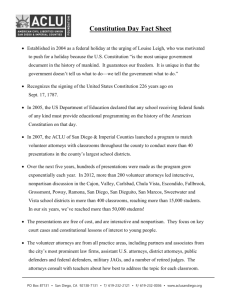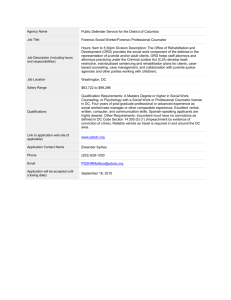Coverage for Prevailing Party Attorneys' Fee Awards
advertisement
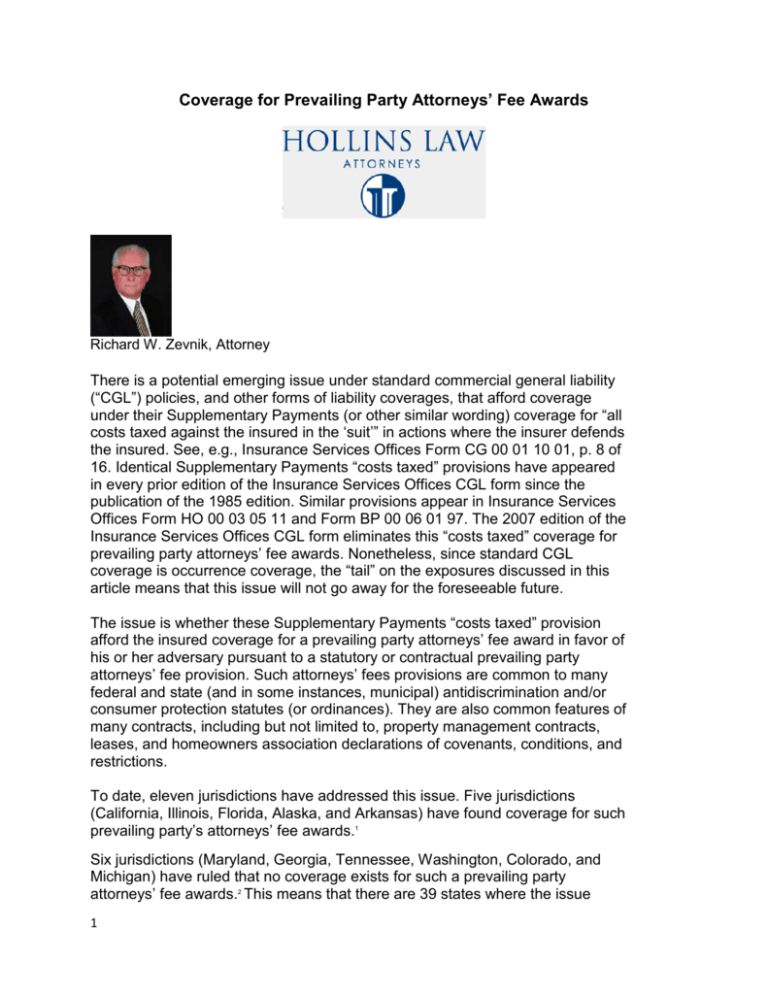
Coverage for Prevailing Party Attorneys’ Fee Awards Richard W. Zevnik, Attorney There is a potential emerging issue under standard commercial general liability (“CGL”) policies, and other forms of liability coverages, that afford coverage under their Supplementary Payments (or other similar wording) coverage for “all costs taxed against the insured in the ‘suit’” in actions where the insurer defends the insured. See, e.g., Insurance Services Offices Form CG 00 01 10 01, p. 8 of 16. Identical Supplementary Payments “costs taxed” provisions have appeared in every prior edition of the Insurance Services Offices CGL form since the publication of the 1985 edition. Similar provisions appear in Insurance Services Offices Form HO 00 03 05 11 and Form BP 00 06 01 97. The 2007 edition of the Insurance Services Offices CGL form eliminates this “costs taxed” coverage for prevailing party attorneys’ fee awards. Nonetheless, since standard CGL coverage is occurrence coverage, the “tail” on the exposures discussed in this article means that this issue will not go away for the foreseeable future. The issue is whether these Supplementary Payments “costs taxed” provision afford the insured coverage for a prevailing party attorneys’ fee award in favor of his or her adversary pursuant to a statutory or contractual prevailing party attorneys’ fee provision. Such attorneys’ fees provisions are common to many federal and state (and in some instances, municipal) antidiscrimination and/or consumer protection statutes (or ordinances). They are also common features of many contracts, including but not limited to, property management contracts, leases, and homeowners association declarations of covenants, conditions, and restrictions. To date, eleven jurisdictions have addressed this issue. Five jurisdictions (California, Illinois, Florida, Alaska, and Arkansas) have found coverage for such prevailing party’s attorneys’ fee awards.1 Six jurisdictions (Maryland, Georgia, Tennessee, Washington, Colorado, and Michigan) have ruled that no coverage exists for such a prevailing party attorneys’ fee awards.2 This means that there are 39 states where the issue 1 remains open. The issue is a significant one, in that in the lead decisions from California, the California Courts of Appeal have ruled that the Supplementary Payments “costs taxed” coverage applies in “suits” where the insurer is defending the insured, and that the Supplementary Payments “costs taxed” coverage is part of the insurer’s defense obligation. Coverage for such prevailing party attorneys’ fee awards therefore is in addition to, and is not subject to the liability coverage’s indemnity limits. See, e.g., Prichard v. Liberty Mut., 84 Cal.App.4th at pp. 912 and 912 fn. 22. Depending on the particular facts of a given suit against the insured that presents such a prevailing party attorneys’ fee award exposure, that exposure could well outstrip the insurer’s exposure under the indemnity coverage. This sort of situation can potentially dramatically alter the settlement dynamics for insurer appointed defense counsel, insured selected independent counsel, insurers’ coverage counsel and their insurer clients, as well as for plaintiffs’ counsel. For example, a common fact pattern implicating the Supplementary Payments “costs taxed” arises in habitational (i.e. slumlord) suits. There are usually allegations of bodily injury and property damage by the affected plaintiff tenants, however, usually with low damages potential. These causes of action are generally combined with causes of action involving racial or ethnic discrimination or sexual harassment, or some other cause of action under federal or state antidiscrimination statutes that contain prevailing party attorneys’ fees provisions. The insurer faces a challenge. The attorneys’ fee exposure is after much larger than any likely covered damages exposure. The longer the case is defended, the greater the potential prevailing party attorneys’ fee exposure becomes. These dynamics can skew the normal settlement dynamics considerably. Another common factual scenario is where a homeowners association is sued by a member, either for failure to maintain or repair common areas, or for alleged unreasonable refusal to approve member’s proposed remodeling of his or her unit. There usually is a small element of potentially covered bodily injury, property damage, or personal injury damages that trigger a duty to defend the association. Again, the prevailing party attorneys’ fee exposure under the CGL coverage becomes a disproportionate driver of the settlement dynamics in such cases. How a given state is likely to decide the issue once it arises will depend largely on how the law of that jurisdiction generally defines “damages,” “attorneys’ fees,” and “costs,” whether by statute, court rule, or by common law. In certain of the decisions listed in the notes, the courts looked to the particular statute that contained the prevailing party attorneys’ fee provision to see whether the statute itself characterized attorneys’ fee awards as “costs.” 2 A brief description of Prichard v. Liberty Mutual and other leading California appellate decisions follows since the appellate authority construing Supplementary Payments coverage for attorneys’ fee awards under the “costs taxed” provisions is more highly developed in California than in other jurisdictions. Prichard involved a prevailing party attorneys’ fee provision in a contract. 84 Cal.App.4th at p. 911. The policy in question used Supplementary Payments “costs taxed” language identical to that of the standard Insurance Services Offices CGL form. Id. The Prichard court looked to the prior 1995 decision of Insurance Company of No. America v. National American Ins. Co., 37 Cal.App.4th 195, 206-207 (1995), which read the Supplementary Payments “costs taxed” provisions together with California Code of Civil Procedure section 1033.5(a)(10), which provides that recoverable “costs” in civil suits include “attorneys’ fees, when authorized by . . . contract . . . statute . . . [or] law.” Since costs under Code of Civil Procedure section 1033.5(a)(10) include prevailing party attorneys’ fee awards in suits defended by the insurer, they were held to be covered. 84 Cal.App.4th at p. 912. Further, the Prichard court held that such prevailing party attorneys’ fee awards are covered as part of the insurer’s defense obligation. Id. at p. 912 fn. 22. Thus, the insurer’s exposure to such attorneys’ fee awards is not limited by the policy’s indemnity limits. Subsequent California Court of Appeal decisions have further clarified issues relating to Supplementary Payments “costs taxed” attorneys’ fee coverage. In State Farm General Ins. Co. v. Mintarsih, 175 Cal.App.4th 274 (2009), the Court of Appeal held that State Farm did not have coverage for the prevailing party attorneys’ fee award entered against the insured in that case. The insured had been sued for false imprisonment and other causes of action by a domestic employee. In addition to her false imprisonment and other tort claims, the plaintiff included statutory causes of action for wage and hour violations under the California Labor Code. 175 Cal.App.4th at p. 280. It was these statutory wage and hour claims on which the attorneys’ fee award against the insured was based. 175 Cal.App.4th at p. 280.3 The Mintarsih court held that since there was no potential for coverage for the Labor Code wage and hour claims, on which the prevailing party attorneys’ fee award was based, the attorneys’ fee award was not part of State Farm’s defense obligation, and no coverage for that award existed. 175 Cal.App.4th at pp. 286287.4 California also has a statutory public policy bar against indemnification for wilful acts. See California Insurance Code section 533. In Combs v. State Farm & Cas. Co., 143 Cal.App.4th 1338, 1344-1346 (2006), the Court of Appeal held that this public policy bar precluded indemnification of the insured for a statutory prevailing party attorneys’ fee award where the insured had been found liable for intentional housing discrimination based on race.5 3 The foregoing decisions illustrate some of the issues that courts in the jurisdictions may confront that have not yet ruled on the question whether the standard CGL Supplementary Payments “costs taxed” coverage applies to prevailing party attorneys’ fees awards entered against their insureds. 1 Prichard v. Liberty Mut. Ins. Co., 84 Cal.App.4th 890, 912 (2000); Littlefield v. Mcguffey, 979 F.2nd 101 (7th Circuit 1992) [applying Illinois law]; Scottsdale Ins. Co. v. Deer Run Property Owner’s Assoc., Inc., 642 So.2nd 786 (Fla.App.1994); R.W. Beck & Assoc. v. City and Burrow of Sitka, 27 F.3d 1475 (9th Circuit 1994) [applying Alaska law]; and Home Indem. Co. v. City of Marianna, 297 Ark.268 (1988) [nonstandard policy language involved]. 2 Dotson v. Chester, 1994 U.S. App.Lexis 28279 (4th Circuit 1994) [applying Maryland law]; Alea London, Ltd. v. American Home Services, Inc., 638 F.3d 768 (11th Circuit 2011) [applying Georgia law]; Sullivan County, Tennessee v. Home Indem. Co., 925 F.2nd 152 (6th Circuit 1991) [applying Tennessee law; non standard policy language involved]; Polygon Northwest Co. v. American Nat’l Fire Ins. Co., 143 Wn.App.753 (2008); Hoang v. Monterra Homes (Powderhorn LLC), 129 P.3d 1028 (Colo.App.2005), reversed on other grounds by Hoang v. Monterra Homes (Powderhorn LLC), 149P.3d 798 (Colo.2007); and Groom v. Home-Owners Ins. Co., 2007 Mich.App.Lexis 1068 (Mich.App.2007). 3 Under California law, liability insurers are required to defend the entirety of the suit against their insureds, even when some fo the causes of action against the insured do not present a potential for coverage. See Buss v. Superior Court, 16 Cal.4th 35, 48 (1997). Under Buss, the insurer may reserve the right to seek reimbursement from the insured after the conclusion of the third party suit of costs of defense that are solely attributable to causes of action for which there is and was no potential for coverage. 16 Cal.4th at pp. 50-53. 4 Thus, in a jurisdiction like California that either allows allocation of defense costs between covered or noncovered causes of action, or that allows the insurer to seek reimbursement of costs of defense solely attributable to noncovered causes of action, the Mintarsih rationale may provide a defense to coverage for a Supplementary Payments “costs taxed” coverage claim. 5 In jurisdictions like California that recognize a statutory or common law intentional act public policy bar to coverage, this may afford a defense to coverage for a fee award. 4
